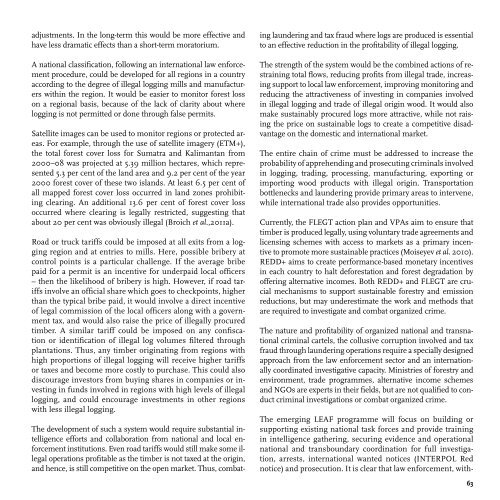Green Carbon, Black Trade - UNEP
Green Carbon, Black Trade - UNEP
Green Carbon, Black Trade - UNEP
You also want an ePaper? Increase the reach of your titles
YUMPU automatically turns print PDFs into web optimized ePapers that Google loves.
adjustments. In the long-term this would be more effective and<br />
have less dramatic effects than a short-term moratorium.<br />
A national classification, following an international law enforcement<br />
procedure, could be developed for all regions in a country<br />
according to the degree of illegal logging mills and manufacturers<br />
within the region. It would be easier to monitor forest loss<br />
on a regional basis, because of the lack of clarity about where<br />
logging is not permitted or done through false permits.<br />
Satellite images can be used to monitor regions or protected areas.<br />
For example, through the use of satellite imagery (ETM+),<br />
the total forest cover loss for Sumatra and Kalimantan from<br />
2000–08 was projected at 5.39 million hectares, which represented<br />
5.3 per cent of the land area and 9.2 per cent of the year<br />
2000 forest cover of these two islands. At least 6.5 per cent of<br />
all mapped forest cover loss occurred in land zones prohibiting<br />
clearing. An additional 13.6 per cent of forest cover loss<br />
occurred where clearing is legally restricted, suggesting that<br />
about 20 per cent was obviously illegal (Broich et al.,2011a).<br />
Road or truck tariffs could be imposed at all exits from a logging<br />
region and at entries to mills. Here, possible bribery at<br />
control points is a particular challenge. If the average bribe<br />
paid for a permit is an incentive for underpaid local officers<br />
– then the likelihood of bribery is high. However, if road tariffs<br />
involve an official share which goes to checkpoints, higher<br />
than the typical bribe paid, it would involve a direct incentive<br />
of legal commission of the local officers along with a government<br />
tax, and would also raise the price of illegally procured<br />
timber. A similar tariff could be imposed on any confiscation<br />
or identification of illegal log volumes filtered through<br />
plantations. Thus, any timber originating from regions with<br />
high proportions of illegal logging will receive higher tariffs<br />
or taxes and become more costly to purchase. This could also<br />
discourage investors from buying shares in companies or investing<br />
in funds involved in regions with high levels of illegal<br />
logging, and could encourage investments in other regions<br />
with less illegal logging.<br />
The development of such a system would require substantial intelligence<br />
efforts and collaboration from national and local enforcement<br />
institutions. Even road tariffs would still make some illegal<br />
operations profitable as the timber is not taxed at the origin,<br />
and hence, is still competitive on the open market. Thus, combating<br />
laundering and tax fraud where logs are produced is essential<br />
to an effective reduction in the profitability of illegal logging.<br />
The strength of the system would be the combined actions of restraining<br />
total flows, reducing profits from illegal trade, increasing<br />
support to local law enforcement, improving monitoring and<br />
reducing the attractiveness of investing in companies involved<br />
in illegal logging and trade of illegal origin wood. It would also<br />
make sustainably procured logs more attractive, while not raising<br />
the price on sustainable logs to create a competitive disadvantage<br />
on the domestic and international market.<br />
The entire chain of crime must be addressed to increase the<br />
probability of apprehending and prosecuting criminals involved<br />
in logging, trading, processing, manufacturing, exporting or<br />
importing wood products with illegal origin. Transportation<br />
bottlenecks and laundering provide primary areas to intervene,<br />
while international trade also provides opportunities.<br />
Currently, the FLEGT action plan and VPAs aim to ensure that<br />
timber is produced legally, using voluntary trade agreements and<br />
licensing schemes with access to markets as a primary incentive<br />
to promote more sustainable practices (Moiseyev et al. 2010).<br />
REDD+ aims to create performance-based monetary incentives<br />
in each country to halt deforestation and forest degradation by<br />
offering alternative incomes. Both REDD+ and FLEGT are crucial<br />
mechanisms to support sustainable forestry and emission<br />
reductions, but may underestimate the work and methods that<br />
are required to investigate and combat organized crime.<br />
The nature and profitability of organized national and transnational<br />
criminal cartels, the collusive corruption involved and tax<br />
fraud through laundering operations require a specially designed<br />
approach from the law enforcement sector and an internationally<br />
coordinated investigative capacity. Ministries of forestry and<br />
environment, trade programmes, alternative income schemes<br />
and NGOs are experts in their fields, but are not qualified to conduct<br />
criminal investigations or combat organized crime.<br />
The emerging LEAF programme will focus on building or<br />
supporting existing national task forces and provide training<br />
in intelligence gathering, securing evidence and operational<br />
national and transboundary coordination for full investigation,<br />
arrests, international wanted notices (INTERPOL Red<br />
notice) and prosecution. It is clear that law enforcement, with-<br />
63
















